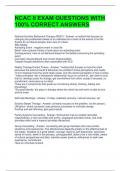NCAC II EXAM QUESTIONS WITH
100% CORRECT ANSWERS
Rational Emotive Behavioral Therapy (REBT) - Answer- a method that focuses on
changing the problematic beliefs of an individual as a result of the events of his life
Events do not disturb people, their view of it does.
ABC Model-
Activating Event - negative event in ones life
Belief- how a person thinks or feels about an activating event
Consequences- how an ind behaved based on the beliefs concerning the activating
event
Counselor should dispute and correct illogical beliefs
Targets thought distortions often associated with SUD
Reality Therapy/Control Theory - Answer- *method that focuses on how the client
perceives the external world & behaviors he exhibits fit those perceptions and needs
*it isn't important how the world really exists, only the client's perception of how it exists.
* basic principles- dev a therapeutic relationship, focus on current bx, ask client to eval
that bx, develop a plan for change, get commitment from client, accept 0 excuses, no
punishment, never give up on client.
*there are 4 components that guide our functioning (doing, thinking, feeling and
physiology)
*Success Identity- the place in therapy where the client has self worth is able to love
and be loved
Self Help Meetings - Answer- 12 step, celebrate recovery, rational recovery, etc
Solution Based Therapy - Answer- primarily focuses on the problem, not the person.,
Utilization- where counselor uses previous successes to motivate change
Positive and self affirming, gets good results
Family Systems Counseling - Answer- SUD person has an enabler (provides
responsibility), a hero (provides self worth), scapegoat (provides focus), lost child
(provides relief) and a mascot (provides distraction)
Group Counseling - Answer- counseling with group members who have similar
situations and experiences. The effectiveness depends greatly on the effectiveness of
the leader. Qualities of a good leader- courage, stamina, self-awareness, openness,
sense of humor, belief in the process, caring/goodwill, abilty to be a role model, aware
of cultural perspectives and bias, maintain power posture, willingness to seek new
experience, commitment
Have an informed consent.
, Stress confidentiality
Screening v Assessments - Answer- Screening tools are brief and determine basic
information, assessment goes further into the meat of things.
Develop an individualized treatment plan - Answer- this is based on the assessment
toole
should have a problem statement, goal statement, measurable objectives, and include
strategies
Treatment Modalities - Answer- Indiv Counseling,
Group Counseling
Family or Systems Counseling,
Detox Tx
Inpatient- hospital style, 24 hr staff
Residential- 24 staff, medical on call
IOP-
OP- assessment/referral programs, education programs, Therapeutic community,
transitional programs,
Documentation - Answer- Make sure to complete progress notes on each visit. These
should include the personal account of the visit, and where the person is on the clinical
course and treatment plan goal
Progress Notes: DAP- data assessment plan or SOAP- subjective, objective
assessment plan
Referral - Answer- the proves of seeking assistance for an issues that is beyond the
scope of your practice. Can be for additional services or to replace you if there is a
reason you are ineffective
multidisciplinary team - Answer- a group of professionals that are all working on the
client. example would be the probation officer, dcs, dhs, and mental health provider
Coordination of care - Answer- collaboration between the client and the multidisciplinary
team
Relapse - Answer- The return to the use of the substance
*usually preceded by clear signs
*begins much earlier than actual use
*Usually due to lack of skills
*Often a reflexive and unconscious matter
*opportunity to learn from mistakes and alter the plan
Identify triggers!!!
Termination & Continuing Care - Answer- termination is when the client leaves
treatment and the relationship is severed.




